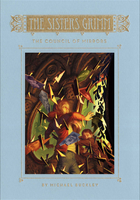“Oh, I hate nursing homes,” my friend Lynn said when I told her about the book I was writing.
Most people do. That's why I'm bringing it up with you now. If I'm going to write a book about a nursing home company, I might as well acknowledge the elephant in the room. People hate nursing homes and certainly don't want to read about them; to be honest, before I really engaged with nursing homes, I didn't particularly want to write about them. But here we are, stuck in this chapter anyway. So I'll let you in on a secret: nursing homes are an astonishingly perfect place to study what happens when we truly see people as people.
How does any ordinary person shift from seeing people as objects—as problems, puppets, or irrelevancies—to really seeing and feeling and being awed by the complicated, infinite, precious greatness of others? If the shift were easy and obvious, we would all see people as people all the time; we would never waste time crippling and blinding ourselves and restraining our potential happiness by seeing others as less than they are. And yet we do it all the time. (At least I do it all the time.) We'll soon learn exactly how we make that shift, but for now the issue is whether it really is possible to see anyone, let alone everyone, in this way.
To prove that seeing people as people is possible in every circumstance and with every type of person, we should see how (and if) it works in the worst environments. And I think one thing our culture universally agrees on is that nursing homes are one of those worst environments. If it can work here, it can work anywhere.
To some extent, this universally low opinion of SNFs is misinformation; nursing homes have changed significantly since the scandal-plagued '70s. Modern skilled nursing facilities, in our healthcare system, are like the next step down after hospitals. If you're stable enough to leave the hospital but not well enough for home, a skilled nursing facility is where you'll end up for as little as a few days or as long as months. In fact, some nursing homes these days only have these short-term, recuperative patients.
Still, a large percentage of those who leave the hospital needing full-time care are the elderly and frail, and many of them will continue to need high levels of care for the rest of their lives. SNFs are for those who are extremely ill or unable to perform basic self-care, whose around-the-clock needs cannot reasonably be met in the average home. They're necessary for many, and their use can help preserve family relationships that would otherwise deteriorate under the stresses of home care. Modern regulations have weeded out most (but of course, not all) underperforming facilities, and patients and their families are generally quite satisfied with their SNF experience.[1]
I asked Lynn why she personally hated nursing homes. “Oh, you know,” she began, and made the usual comments. She hates nursing homes because they're depressing, they're the place you go to die, they're institutional and impersonal, they smell bad. They represent the worst of what we fear about our own lives—that in the end our lives will count for nothing, that after all our hard work and our loves and joys and our sufferings, there will be nothing to show for it. And finally, she doubted that they could provide the kind of love and support people receive at home. “That's why I worked so hard to make sure my grandma didn't end up there,” Lynn said.
Then she admitted, more honestly than most, “Actually, I've only ever been in one once.” When she was in high school, a friend of hers had visited—on her own—a nursing home and had dragged Lynn with her. The friend went from room to room, talking to everybody, “Just talking to them normally,” Lynn told me, shaking her head in amazement, “like they were people.”
Obviously, nursing home residents are people, but we all know what she meant because we think the same way sometimes: the type of old people who end up in skilled nursing facilities are the extremely frail and sick and often mentally impaired, who don't seem like the rest of us. Normally when you talk to people they talk back, they interact, they're closer to your own age, they can walk by themselves, and so on. We have expectations about what people do and what talking to people is like, and dealing with the frail elderly doesn't match those expectations. Many of us, like Lynn, view those who interact comfortably with the aged population “like they were people” as rare and somehow unfathomable.
When most of us walk into a nursing home, we see a whole lot of people looking like not-people. An old lady sits in her wheelchair with her head lolling to one side. An old man wears a bib to catch his drool. Many of them soil themselves. We know they're people, they're recognizably humans, but very often when the environment is new to us, we don't know how to act, we don't know what to say to them: “Nice bib”? In fact, when I asked nurses and administrators what they had thought about nursing homes before they began working in one, about two-thirds replied “They're gross,” “They're depressing,” or both. I had been in a few nursing homes as a teenager to sing Christmas carols, but I didn't enjoy it; singing was fun, but it seemed pointless since the residents didn't even clap.
So it's no surprise that people often hate nursing homes. It's no wonder we tend to avoid them, find ourselves uncomfortable or frightened, visit our loved ones in them infrequently, and hope that we never end up in one. It's no wonder, indeed, but like so many things, we turn out to be wrong about them.
“They Deserve”
Miguel is the maintenance director at a large nursing home in California. He's a big man with a gray goatee who speaks minimal English; he answered the questions I asked him about his job very shyly and haltingly. Finally, I asked him if he enjoyed his work, and he suddenly lit up, nodding energetically and repeating “Yes, very much.” Surprised, I asked him why. After all, a maintenance director (sometimes called a facility manager or facility engineer) at a nursing home mostly replaces lightbulbs and orders trash can liners and checks to see which part of the sixty-year-old building will fail next. I might have expected his vibrant response from a nurse or caregiver who had chosen to go into healthcare to help people. But Miguel's level of enthusiasm seemed, at the very least, a little out of proportion to the glamour of his job.
He paused. We were standing in the hallway of a rather bustling facility, and he opened his arms wide and gestured at the residents in wheelchairs and rooms, his command of English not sufficient to convey what he wanted to tell me. Still pointing around, he looked me in the eye very seriously, almost emotionally, and deliberately issued his answer: “They deserve.”
Here was a maintenance director—not a field people tend to enter out of their love for the downtrodden—who passionately loves his job because he so highly values these old men and women whom his work affects. For the same people about whom I thought “Why do we even come here to sing to them? They don't even clap,” he's delighted to fix their broken lamps because “they deserve.” They deserve visits and entertainment even if they can't clap. They deserve lights and safe floors and working televisions even if they can't sit upright unassisted. Just like other people, they deserve. Miguel wasn't just taking care of the physical building; he was taking care of the needs of the residents whom he saw as fully deserving people. These ailing elderly were often forgotten, dishonored, and disrespected by society and sometimes even by their families but not by him.
What's the Best Part of Your Job?
This is as good a time as any for one interesting unscientific statistic: I asked well over one hundred nursing home staff members in all departments the same question: “What's the best part of your job?” Almost all of them, somewhere in the range of 97 percent, answered with some variation of “The best part is the residents.” This was true even for people who didn't particularly like their jobs, who didn't intend to stay in skilled nursing or in their current positions, or who were in transitioning facilities with imperfect working environments: what they did like was the residents.
This is remarkable to me. We just went through the reasons why nursing homes are so depressing to most of us, and that answer too was “the residents” in their alien fragility. Yet to those who know the skilled nursing facilities the best, the residents aren't depressing—they are literally and universally the best part of the job.
CNAs are the ones who spend the most time with residents, and they could be positively effusive about it.[2] They told me over and over how much they enjoyed listening to their patients and hearing about their lives and getting to know them. As far as I could tell from hanging out with them, they were always too busy to chat, but somehow or other, while changing bed-sheets or waiting for the shower room or taking plastic covers off lunch items, they would find time to talk with the residents and, while bustling through their endless tasks, would listen to what they had to say. They didn't seem to care that many consider theirs the worst job in the world: they felt not just lucky but blessed to have found this work.
This sentiment was widespread. A physical therapy assistant told me, gushingly, “And they always tell you their stories about their life, about how they grew up or how many kids they had. The good stuff and the bad stuff. They talk about that. It's like all these layers of them that they share with us when we get to work with them. And then especially when you get to watch them get better, suffer less—it's amazing. It's like the biggest gift.”
Caitlyn was hired to be the marketing director for one busy facility. After a few weeks of work, getting to know the industry, the staff, and the residents, she took a course and got certified as a CNA. She didn't need to; it's not part of marketing. She just wanted to be able to help residents directly.
Another pair, two young women who worked together in admissions and marketing at a truly delightful facility, talked to me for a full hour about how much they loved their work. They were both bright, attractive young women who could have had careers in sexier fields but who insisted that working with the elderly population was “an honor and a privilege.”
The therapy director at one facility had been on her way to becoming a pediatric occupational therapist with a specialty in autism. But her program required an adult internship, which happened to be in a nursing home. “I have no grandparents,” she told me and, mimicking her previous self, said, “and I thought, ‘I don't know how to talk to old people!’” Her plan was just to wait out the internship and get back to working with children. She laughs now, talking about it. “Three months later I never wanted to leave. Guess what? They're people. They're fun. They're kind. They just want their lives back.”
In a world where nobody ever hears about nursing homes except when there's a scandal, you could end up with the idea that nursing home employees are sullen, heartless folks who sit around all day looking for old ladies to steal from. In fact, one of the reasons so many of us hate the idea of allowing loved ones to “end up” in a nursing home is the assumption that they will be ignored and unloved. And no doubt there are some sullen, heartless employees, but my experience was overwhelmingly the opposite. The staff cared deeply about their residents and felt lucky to get to know them. In fact, direct care staff in skilled nursing facilities have surprisingly high job satisfaction (around 60-65 percent), and CNAs report an extremely high “sense of accomplishment” (85 percent).[3] Despite high turnover in the industry, around 34 percent of CNAs stay in the same facility for more than five years.[4] All because they love the residents.
Here's a revealing story: one independent eighty-one-year-old veteran named Rich, living alone far off the grid with just his beloved dog for company, had a terrible accident and ended up with serious burns all over the lower part of his body. He was so far away from any hospitals that he had to catch a ride on a tourist bus to the nearest large city. By the time he arrived at the VA hospital hours later, his pant legs were soaked from the residue of bursting blisters.
Rich ended up doing recuperation and therapy in an HG nursing home, where he became the topic of a newspaper article about the difficulties seniors face in trying to live independently.[5] The article makes the briefest mention of one of his physical therapists, a woman named Faith, who drove all the way out to his desert home—on her own initiative and on her own time—almost three hundred miles round trip, to pick up his dog.
Isn't that astonishing? I actually heard this story from someone at the facility and only later found out about the article. It's touching and inspiring—a physical therapy assistant in a nursing home cared so much about this man that when he spoke of his longing for his left-behind dog, she couldn't rest without bringing him back. So she did, and the entire facility welcomed the dog into their lives for the rest of Rich's stay. It's an amazing story, and yet, even when a newspaper reporter was in the facility and heard the story, the printed article was all about the struggles and problems the lone elderly face. It doesn't even point out that in long-term care facilities, the elderly in fact can find devoted advocates like Faith who take on the role of family.
The fact is, seeing these residents as people, no matter how they look or how oddly they act, is absolutely possible. There are among us people who look past the differences and changes and can see that past the stroke-stilled face, beyond the illness, and behind the useless vocal cords, is a human being, not an object. This is a person who has lived and suffered and learned and loved and who likes some things and not others and now is trapped in a body that won't cooperate with him or her.
A social worker named Sara told me about one of her favorite residents. He had come to them from prison, where he had fallen out of his bunk and been beaten so severely he would now be in the nursing home for the rest of his life. His family wanted nothing to do with him—and apparently with reason; he seems to have been in prison for trying to kill a family member. One day Sara called his brother for some matter about his care, and this brother yelled at her: “I don't want you to ever call me unless you're telling me he's dead.” He never had a single visitor.
And yet he was a staff favorite: kind, loving, and funny. The other residents loved talking to him because he was so cheerful and friendly. He wasn't always easy to deal with; he struggled with aphasia and grunted, but people worked with it. Sara loved him; he had a habit of kissing her hand, so she always calls him My Prince. “Well, hello, My Prince!” she would say if she saw him out in the hall, and he would smile and kiss her hand.
There's a lot no one knows about My Prince's story: was he severely provoked, was his previous violence due to abuse or trauma, did his beating cause (or restore) his current personality, or was he always thus? One thing we do know is that his family is missing out on knowing him as he is now—a delight to all who encounter him.
Sara told me this story to explain why, exactly, she loved her job so very much and why she found working in a nursing home so fulfilling. “Here,” she said, with tender emphasis, “he gets that second chance to be loved by people.”
The Author and the Angel: A Thought Experiment
To prove my point, I'm going to offer you a thought experiment, an imaginary case study. Although it's imaginary, it's based on actual SNF residents I met and interactions I had or witnessed.
Let's imagine that a person who is primarily thinking about herself and her own preferences and needs (let's call her the Author) enters a nursing home. She sees an elderly man drooling in the hallway. She doesn't enjoy seeing that kind of infantility in a grown man—it's unpleasant and gross—so she walks away. The Author next encounters an old man muttering the same phrase over and over again; it's creepy, so she goes down the hall where she can't hear him. But now the Author sees an old woman, almost too large for her wheelchair, sitting there nodding mindlessly with some sort of paper on her head, and it's official: the Author hates nursing homes. She's tried it, and it wasn't for her; thanks, but no thanks.
Now imagine that someone with a caring and attentive heart, someone ready to see people, enters. Let's call her the Angel. She sees an elderly man drooling onto a bib in the hallway, but she also notices he's wearing a Warriors cap; the Angel asks the man if he likes basketball. The man's responses are muffled and hard to understand but passionate. He loves the Warriors and watches every game. He's waiting for his son to take him to one right now. His stroke cost him control over his face but can't lessen his love for the Warriors! The Angel wishes him a good outing and moves down the hall. Next she encounters an old man muttering the same phrase over and over. She goes nearer to try to figure it out. It sounds like “Vienna, Austria.” “Are you from Vienna?” she asks. He shakes his head. He says “Warsaw, Poland” and “Lima, Peru.” Then the Angel gets it. “You know the capitals!” she says, and he nods and proudly wheels away. The Angel keeps walking until she sees a large woman nodding in her wheelchair. She has a gold paper crown on her head and multiple plastic beaded necklaces around her neck. “Are you celebrating something today?” she asks, “You look so festive.” The woman smiles and appears to enjoy the compliment but seems unable to speak. A nurse sees them and comes over to explain. “It was her birthday,” she explains affectionately. “She likes to sit out here with her treasures on so everyone can see. It makes her so happy, so we let her do this all week.” Ah, the Angel thinks. “Happy birthday!” she says, and the patient beams and nods.
In these two scenarios, the physical world is the same. Neither the Author nor the Angel had ever met the residents before, and the residents were exactly the same. But one of them is disgusted and will never try it again. The other has, with very little effort, figured out what matters to three human beings and shown them that they are cared for and that they matter, and she feels energized and cheered up by being let in on their unique, simple joys. The two visitors' experiences of the very same people were completely different not because the residents were different but because their ways of seeing the residents were different. The shift to seeing people as people changes everything.
To those who live, work, visit, or pass away there, nursing homes are sacred spaces. I use that word advisedly; after all, it's how HG leaders talk. As one told me, “There are few places as sacred as nursing homes. People come in and it's their home, which is sacred. And then through nursing and rehab, they arise and walk from their beds and are healed. Or people come there and pass away, and their families gather there to pray and cry and hold hands with one another. There's no more sacred place than that. It's hallowed ground.” The memories the patients bring with them, I would add, are sacred as well, for they are unique to the person who has celebrated and endured a long life to collect them.
Nursing home residents don't cause disgust; we cause it ourselves by thinking of ourselves and what we're comfortable looking at and not of them and what they need. When we are thinking, “What do I say?” we are thinking about ourselves—what is comfortable and not embarrassing for us. The staff members I met weren't thinking “What do I say?”; they were thinking “What do you need?” They were focused on figuring out how they could help. And what they saw—the astonishing, infinite reality of the human others and the possibility of connecting with them—was available to them because of their focus and way of seeing. Seeing people as people came out of the staff members' openness and concern, and they were enriched by it. Seeing the old people as objects comes out of a closed, inward focus on one's own self and comfort.
Many people, as we all know, are not easy to see as people. Some of our coworkers, neighbors, and even family members are difficult to view as valuable, as treasures, when their behavior is aggressive, annoying, or otherwise off-putting. These nursing home staff, however, show us that it's possible to see value, sanctity, and even heroism in others, no matter how difficult our circumstance or how unappealing their behavior or appearance. Even your most problematic people, I dare predict, have greatness and heroism inside them, waiting to be noticed. If the shift is possible among nursing home residents and workers, it surely is possible for the rest of us.
注释:
[1]National Research Corporation, 2011-2012 National Survey of Customer and Employee Satisfaction in Nursing Homes, American Health Care Association, 2012, and My InnerView Inc., 2006 National Survey of Resident and Family Satisfaction in Nursing Facilities, May 2007,
[2]You don't have to take my word for it either. You can find similar responses online; for example, see the replies to Cathylady, “Does Anyone Like Their CNA Job?” Allnurses forum, February 27, 2015, And I love another exchange that shows more clearly than I ever could the degree to which the best CNAs and nurses truly see their residents as people. A CNA student posted a complaint about patients and was roundly criticized by responders: Beeboop12, “This might be really mean but I have to say it . . .,” Allnurses forum, September 10, 2017,
[3]These numbers come from National Research Corporation, 2011-2012 National Survey. For other support, see Darcie M. Brady, “Exploration of Nursing Assistants' Beliefs about Job Satisfaction” (doctoral thesis, Regis University, 2016); American Health Care Association Department of Research, Report of Findings, 2009 Nursing Facility Staff Retention and Turnover Survey (Washington, DC: American Health Care Association, 2011); Karen Pennington, Jill Scott, and Kathy Magilvy, “The Role of Certified Nursing Assistants in Nursing Homes,” Journal of Nursing Administration 33, no. 11 (2003): 578--584; and Nicholas G. Castle, “Assessing Job Satisfaction of Nurse Aides in Nursing Homes: The Nursing Home Nurse Aide Job Satisfaction Questionnaire,” Journal of Gerontological Nursing 33, no. 5 (2007): 41-47.
In comparison, the overall US workforce has job satisfaction scores that hover around 50 percent. The Conference Board 2017 Consumer Confidence Survey showed an overall worker satisfaction score above 50 percent for the first time since 2005: Conference Board, “More Than Half of US Workers Are Satisfied with Their Jobs,” press release, September 1, 2017,
[4]Nursing homes in general have a surprising mix of high turnover and high longevity. The job of a CNA is highly demanding and not highly paid, which contributes to high turnover. However, a strong sense of meaning and devotion to residents keeps CNAs in the industry, even when they switch locations, and a substantial minority remain in their facilities year after year. One recent study even suggests that the historically high turnover rates reported for CNAs in nursing homes are misleading and that meaningful turnover might be lower.
The data on CNA turnover in skilled nursing facilities are complex and surprising, supporting both the difficulties of the job and the character of the people who choose it as a career. See Jules Rosen et al., “Stayers, Leavers, and Switchers among Certified Nursing Assistants in Nursing Homes: A Longitudinal Investigation of Turnover Intent, Staff Retention, and Turnover,” Gerontologist 51, no. 5 (2011): 597-609, Joshua M. Weiner et al., “Why Do They Stay? Job Tenure among Certified Nursing Assistants in Nursing Homes,” Gerontologist 49, no. 2 (2009): 198-210, Diane Brannon et al., “An Exploration of Job, Organizational, and Environmental Factors Associated with High and Low Nursing Assistant Turnover,” Gerontologist 42, no. 2 (2002): 159-168, Marie Squillace et al., “An Introduction to the National Nursing Assistant Survey,” Vital and Health Statistics 1, no. 44 (2007); American Health Care Association, 2012 Staffing Report, 2014, and Iowa Caregivers Association, Certified Nursing Assistant Recruitment and Retention Project”Final Report Summary, “Iowa Department of Human Services, December 2000,
[5]Lois M. Collins, “When Growing Old the Way You Want and Reality Catch Up to Each Other,” Deseret News, December 29, 2015,















